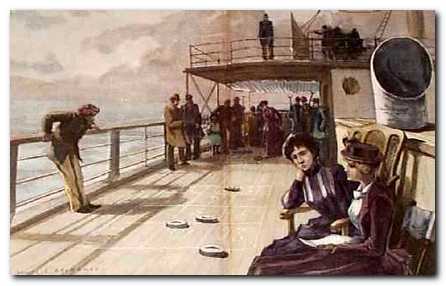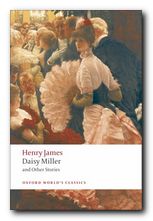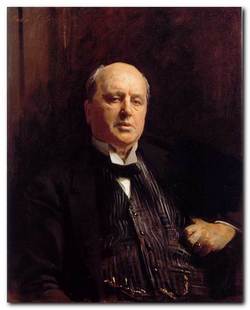tutorial, commentary, study resources, and web links
The Patagonia (1888) like many of James’s other stories, has its origins in an anecdote relayed to him over the dinner table – a story which he elaborated and refined. It is also his ‘response’ to a very similar tale by Anthony Trollope called The Journey to Panama which also features a young woman on a long sea voyage going to meet the man to whom she is betrothed. It’s also another variation on his Daisy Miller theme – the ‘new type’ of woman or the ‘self-made girl’ who pushes against the boundaries of social convention – at a cost to herself.

nineteenth century transatlantic steamer
The Patagonia – critical commentary
Class and behaviour
This story, like James’s other stories Daisy Miller and Pandora features a young woman of a ‘new type’ who flouts the conventions of socially acceptable behaviour established by members of the upper class. Grace Mavis is from a family in business class who live in a suburb of Boston for people who are socially aspirant. In fact her father has lost his ‘position’ and has become an invalid. Her mother seeks the social protection of Mrs Nettlepoint during the voyage from Boston to Liverpool – and can only do so with the recommendation of a mutual (and upper-class) friend Mrs Allen. Mrs Nettlepoint therefore feels she has a social obligation to protect Grace’s reputation whilst she is in transit to her husband-to-be.
But as the voyage begins, Grace feels free to behave as she wishes, and we ultimately learn that faced with the prospect of a marriage which she fears, she is affected by the romantic prospects that Jasper Nettlepoint appears to be offering her. She defies the conventions of restriction placed on an unmarried woman spending a significant amount of time in public with a single man. This at the time would be seen as behaviour compromising her reputation.
Grace as victim
It’s possible to argue that Grace is a victim of New England rectitude, the viciousness of social gossip, and the shortsighted meddling interference of the narrator. As a middle-class girl she has few prospects of marriage other than the one offered to her when she was twenty. Because of her father’s redundancy and illness, the family’s fortunes have slid further downhill. She is on her way to the one poor prospect still open to her – marriage to the feckless David Porterfield.
In the spiritually liberating ambiance of a cross-Atlantic voyage, she is swept off her feet by the attentions of a rich and handsome younger man. But she is surrounded by gossip and intrigue. Mrs Nettlepoint wishes to protect her son from what she sees as a socially improper alliance (to a lower class woman). The narrator wishes to fend off Jasper’s attentions, unless he is prepared to accept the consequences – which would be to protect Grace’s reputation by marrying her. Meanwhile characters such as Mrs Peck fuel the dining room with minute by minute reports on Grace’s movements.
Grace has a passionate interview with Mrs Nettlepoint, defending her actions. But she is a single spirit battling against a much stronger social current. She realises that her temporary happiness will be taken from her, and she feels that what lies ahead will be like a living death (despite her protestations to the contrary). So she takes what she sees as the only way out – and jumps ship.
Symmetries
The Patagonia sails from Boston at the start of the story and arrives in Liverpool at the end – which neatly ties together the New World with the Old (America and Europe) which James was so fond of exploring in his tales and novels.
The Patagonia – study resources
![]() The Complete Works of Henry James – Kindle edition – Amazon UK
The Complete Works of Henry James – Kindle edition – Amazon UK
![]() The Complete Works of Henry James – Kindle edition – Amazon US
The Complete Works of Henry James – Kindle edition – Amazon US
![]() Complete Stories 1884—1891 – Library of America – Amazon UK
Complete Stories 1884—1891 – Library of America – Amazon UK
![]() Complete Stories 1884—1891 – Library of America – Amazon US
Complete Stories 1884—1891 – Library of America – Amazon US
![]() The Patagonia – Oxford World Classics – Amazon UK
The Patagonia – Oxford World Classics – Amazon UK
![]() The Patagonia – Oxford World Classics – Amazon US
The Patagonia – Oxford World Classics – Amazon US
![]() Tales of Henry James – Norton Critical Editions
Tales of Henry James – Norton Critical Editions
![]() The Patagonia – Kindle annotated eBook edition
The Patagonia – Kindle annotated eBook edition
![]() The Patagonia – eBook formats at Project Gutenberg
The Patagonia – eBook formats at Project Gutenberg
![]() The Cambridge Companion to Henry James – Amazon UK
The Cambridge Companion to Henry James – Amazon UK
![]() Henry James at Wikipedia – biographical notes, links
Henry James at Wikipedia – biographical notes, links
![]() Henry James at Mantex – tutorials, biography, study resources
Henry James at Mantex – tutorials, biography, study resources
The Patagonia – plot summary
Part I. An unnamed middle-aged narrator calls on his friend Mrs Nettlepoint the day before they are due to sail from Boston to Liverpool on The Patagonia. Her son Jasper is not sure if he will accompany them or not. But when they are joined by the attractive Grace Mavis, who will also be on the voyage, Jasper suddenly decides to go with them. Grace, who is thirty, has been engaged for ten years to David Porterfield, a student of architecture in Paris, and she is going there to marry him – apparently with little enthusiasm.
 Part II. On board, Jasper is very attentive to Grace, so much so that passengers begin to gossip about them. Mrs Nettlepoint even suspects that Grace might have designs on her son. All available evidence suggests that some sort of romantic relationship is developing between the two of them. The narrator and Mrs Nettlepoint are alarmed at this development. She feels maternally protective towards her son, and the narrator thinks that Grace’s reputation is being compromised. They feel that they should warn and reprimand the two younger characters.
Part II. On board, Jasper is very attentive to Grace, so much so that passengers begin to gossip about them. Mrs Nettlepoint even suspects that Grace might have designs on her son. All available evidence suggests that some sort of romantic relationship is developing between the two of them. The narrator and Mrs Nettlepoint are alarmed at this development. She feels maternally protective towards her son, and the narrator thinks that Grace’s reputation is being compromised. They feel that they should warn and reprimand the two younger characters.
Part III. Mrs Nettlepoint challenges Grace, who defends herself by saying that she is doing nothing wrong. When the narrator points out to Jasper that his behaviour is putting Grace in a socially invidious position, he is told virtually to mind his own business.
Part IV. Gossip about the affair continues, Jasper’s and Grace’s behaviour becomes erratic, but there is no resolution, until finally Grace jumps overboard in the middle of the night. The narrator is then faced with the difficulty of breaking the news to her fiancé who meets the ship as it docks at Liverpool.

Henry James – portrait by John Singer Sargeant
Principal characters
| I | an unnamed middle-aged narrator |
| Mrs Nettlepoint | an upper-class Bostonian lady – friend of the narrator |
| Jasper Nettlepoint | her handsome and well-travelled son |
| Mrs Allen | friend of Mrs Nettlepoint who ‘recommends’ Mrs Mavis |
| Mrs Mavis | middle-class lady from less prosperous part of Boston |
| Mr Mavis | an invalid who has lost his job |
| Grace Mavis | their spirited thirty year old daughter |
| David Porterfield | a student of architecture living in Paris |
| Mrs Peck | a passenger and neighbour of the Mavis family |

Henry James’s study
Further reading
Biographical
![]() Theodora Bosanquet, Henry James at Work, University of Michigan Press, 2007.
Theodora Bosanquet, Henry James at Work, University of Michigan Press, 2007.
![]() F.W. Dupee, Henry James: Autobiography, Princeton University Press, 1983.
F.W. Dupee, Henry James: Autobiography, Princeton University Press, 1983.
![]() Leon Edel, Henry James: A Life, HarperCollins, 1985.
Leon Edel, Henry James: A Life, HarperCollins, 1985.
![]() Philip Horne (ed), Henry James: A Life in Letters, Viking/Allen Lane, 1999.
Philip Horne (ed), Henry James: A Life in Letters, Viking/Allen Lane, 1999.
![]() Henry James, The Letters of Henry James, Adamant Media Corporation, 2001.
Henry James, The Letters of Henry James, Adamant Media Corporation, 2001.
![]() Fred Kaplan, Henry James: The Imagination of Genius, Johns Hopkins University Press, 1999
Fred Kaplan, Henry James: The Imagination of Genius, Johns Hopkins University Press, 1999
![]() F.O. Matthieson (ed), The Notebooks of Henry James, Oxford University Press, 1988.
F.O. Matthieson (ed), The Notebooks of Henry James, Oxford University Press, 1988.
Critical commentary
![]() Elizabeth Allen, A Woman’s Place in the Novels of Henry James London: Macmillan Press, 1983.
Elizabeth Allen, A Woman’s Place in the Novels of Henry James London: Macmillan Press, 1983.
![]() Ian F.A. Bell, Henry James and the Past, London: Palgrave Macmillan, 1993.
Ian F.A. Bell, Henry James and the Past, London: Palgrave Macmillan, 1993.
![]() Millicent Bell, Meaning in Henry James, Cambridge (MA): Harvard University Press, 1993.
Millicent Bell, Meaning in Henry James, Cambridge (MA): Harvard University Press, 1993.
![]() Harold Bloom (ed), Modern Critical Views: Henry James, Chelsea House Publishers, 1991.
Harold Bloom (ed), Modern Critical Views: Henry James, Chelsea House Publishers, 1991.
![]() Kirstin Boudreau, Henry James’s Narrative Technique, Macmillan, 2010.
Kirstin Boudreau, Henry James’s Narrative Technique, Macmillan, 2010.
![]() J. Donald Crowley and Richard A. Hocks (eds), The Wings of the Dove, New York: W.W. Norton and Company, 1978.
J. Donald Crowley and Richard A. Hocks (eds), The Wings of the Dove, New York: W.W. Norton and Company, 1978.
![]() Victoria Coulson, Henry James, Women and Realism, Cambridge University Press, 2009.
Victoria Coulson, Henry James, Women and Realism, Cambridge University Press, 2009.
![]() Daniel Mark Fogel, A Companion to Henry James Studies, Greenwood Press, 1993.
Daniel Mark Fogel, A Companion to Henry James Studies, Greenwood Press, 1993.
![]() Virginia C. Fowler, Henry James’s American Girl: The Embroidery on the Canvas, Madison (Wis): University of Wisconsin Press, 1984.
Virginia C. Fowler, Henry James’s American Girl: The Embroidery on the Canvas, Madison (Wis): University of Wisconsin Press, 1984.
![]() Jonathan Freedman, The Cambridge Companion to Henry James, Cambridge University Press, 1998.
Jonathan Freedman, The Cambridge Companion to Henry James, Cambridge University Press, 1998.
![]() Judith Fryer, The Faces of Eve: Women in the Nineteenth Century American Novel, Oxford: Oxford University Press, 1976
Judith Fryer, The Faces of Eve: Women in the Nineteenth Century American Novel, Oxford: Oxford University Press, 1976
![]() Roger Gard (ed), Henry James: The Critical Heritage, London: Routledge, 1968.
Roger Gard (ed), Henry James: The Critical Heritage, London: Routledge, 1968.
![]() Tessa Hadley, Henry James and the Imagination of Pleasure, Cambridge University Press, 2009.
Tessa Hadley, Henry James and the Imagination of Pleasure, Cambridge University Press, 2009.
![]() Barbara Hardy, Henry James: The Later Writing (Writers & Their Work), Northcote House Publishers, 1996.
Barbara Hardy, Henry James: The Later Writing (Writers & Their Work), Northcote House Publishers, 1996.
![]() Richard A. Hocks, Henry James: A study of the short fiction, New York: Twayne Publishers, 1990.
Richard A. Hocks, Henry James: A study of the short fiction, New York: Twayne Publishers, 1990.
![]() Donatella Izzo, Portraying the Lady: Technologies of Gender in the Short Stories of Henry James, University of Nebraska Press, 2002.
Donatella Izzo, Portraying the Lady: Technologies of Gender in the Short Stories of Henry James, University of Nebraska Press, 2002.
![]() Colin Meissner, Henry James and the Language of Experience, Cambridge University Press, 2009
Colin Meissner, Henry James and the Language of Experience, Cambridge University Press, 2009
![]() John Pearson (ed), The Prefaces of Henry James, Pennsylvania State University Press, 1993.
John Pearson (ed), The Prefaces of Henry James, Pennsylvania State University Press, 1993.
![]() Richard Poirer, The Comic Sense of Henry James, Oxford: Oxford University Press, 1967.
Richard Poirer, The Comic Sense of Henry James, Oxford: Oxford University Press, 1967.
![]() Hugh Stevens, Henry James and Sexuality, Cambridge University Press, 1998.
Hugh Stevens, Henry James and Sexuality, Cambridge University Press, 1998.
![]() Merle A. Williams, Henry James and the Philosophical Novel, Cambridge University Press, 1993.
Merle A. Williams, Henry James and the Philosophical Novel, Cambridge University Press, 1993.
![]() Judith Woolf, Henry James: The Major Novels, Cambridge University Press, 1991.
Judith Woolf, Henry James: The Major Novels, Cambridge University Press, 1991.
![]() Ruth Yeazell (ed), Henry James: A Collection of Critical Essays, Longmans, 1994.
Ruth Yeazell (ed), Henry James: A Collection of Critical Essays, Longmans, 1994.
Other works by Henry James
 Washington Square (1880) is a superb early short novel, It’s the tale of a young girl whose future happiness is being controlled by her strict authoritarian (but rather witty) father. She is rather reserved, but has a handsome young suitor. However, her father disapproves of him, seeing him as an opportunist and a fortune hunter. There is a battle of wills – all conducted within the confines of their elegant New York town house. Who wins out in the end? You will probably be surprised by the outcome. This is a masterpiece of social commentary, offering a sensitive picture of a young woman’s life.
Washington Square (1880) is a superb early short novel, It’s the tale of a young girl whose future happiness is being controlled by her strict authoritarian (but rather witty) father. She is rather reserved, but has a handsome young suitor. However, her father disapproves of him, seeing him as an opportunist and a fortune hunter. There is a battle of wills – all conducted within the confines of their elegant New York town house. Who wins out in the end? You will probably be surprised by the outcome. This is a masterpiece of social commentary, offering a sensitive picture of a young woman’s life.
![]() Buy the book from Amazon UK
Buy the book from Amazon UK
![]() Buy the book from Amazon US
Buy the book from Amazon US
 The Aspern Papers (1888) is a psychological drama set in Venice which centres on the tussle for control of a great writer’s correspondence. An elderly lady, ex-lover of the writer, seeks a husband for her daughter. But the potential purchaser of the papers is a dedicated bachelor. Money is also at stake – but of course not discussed overtly. There is a refined battle of wills between them. Who will win in the end? As usual, James keeps the reader guessing. The novella is a masterpiece of subtle narration, with an ironic twist in its outcome. This collection of stories also includes three of his accomplished long short stories – The Private Life, The Middle Years, and The Death of the Lion.
The Aspern Papers (1888) is a psychological drama set in Venice which centres on the tussle for control of a great writer’s correspondence. An elderly lady, ex-lover of the writer, seeks a husband for her daughter. But the potential purchaser of the papers is a dedicated bachelor. Money is also at stake – but of course not discussed overtly. There is a refined battle of wills between them. Who will win in the end? As usual, James keeps the reader guessing. The novella is a masterpiece of subtle narration, with an ironic twist in its outcome. This collection of stories also includes three of his accomplished long short stories – The Private Life, The Middle Years, and The Death of the Lion.
![]() Buy the book from Amazon UK
Buy the book from Amazon UK
![]() Buy the book from Amazon US
Buy the book from Amazon US
 The Spoils of Poynton (1896) is a short novel which centres on the contents of a country house, and the question of who is the most desirable person to inherit it via marriage. The owner Mrs Gereth is being forced to leave her home to make way for her son and his greedy and uncultured fiancee. Mrs Gereth develops a subtle plan to take as many of the house’s priceless furnishings with her as possible. But things do not go quite according to plan. There are some very witty social ironies, and a contest of wills which matches nouveau-riche greed against high principles. There’s also a spectacular finale in which nobody wins out.
The Spoils of Poynton (1896) is a short novel which centres on the contents of a country house, and the question of who is the most desirable person to inherit it via marriage. The owner Mrs Gereth is being forced to leave her home to make way for her son and his greedy and uncultured fiancee. Mrs Gereth develops a subtle plan to take as many of the house’s priceless furnishings with her as possible. But things do not go quite according to plan. There are some very witty social ironies, and a contest of wills which matches nouveau-riche greed against high principles. There’s also a spectacular finale in which nobody wins out.
![]() Buy the book from Amazon UK
Buy the book from Amazon UK
![]() Buy the book from Amazon US
Buy the book from Amazon US
Henry James – web links
![]() Henry James at Mantex
Henry James at Mantex
Biographical notes, study guides, tutorials on the Complete Tales, book reviews. bibliographies, and web links.
![]() The Complete Works
The Complete Works
Sixty books in one 13.5 MB Kindle eBook download for £1.92 at Amazon.co.uk. The complete novels, stories, travel writing, and prefaces. Also includes his autobiographies, plays, and literary criticism – with illustrations.
![]() The Ladder – a Henry James website
The Ladder – a Henry James website
A collection of eTexts of the tales, novels, plays, and prefaces – with links to available free eTexts at Project Gutenberg and elsewhere.
![]() A Hyper-Concordance to the Works
A Hyper-Concordance to the Works
Japanese-based online research tool that locates the use of any word or phrase in context. Find that illusive quotable phrase.
![]() The Henry James Resource Center
The Henry James Resource Center
A web site with biography, bibliographies, adaptations, archival resources, suggested reading, and recent scholarship.
![]() Online Books Page
Online Books Page
A collection of online texts, including novels, stories, travel writing, literary criticism, and letters.
![]() Henry James at Project Gutenberg
Henry James at Project Gutenberg
A major collection of eTexts, available in a variety of eBook formats.
![]() The Complete Letters
The Complete Letters
Archive of the complete correspondence (1855-1878) work in progress – published by the University of Nebraska Press.
![]() The Scholar’s Guide to Web Sites
The Scholar’s Guide to Web Sites
An old-fashioned but major jumpstation – a website of websites and resouces.
![]() Henry James – The Complete Tales
Henry James – The Complete Tales
Tutorials on the complete collection of over one hundred tales, novellas, and short stories.
![]() Henry James on the Internet Movie Database
Henry James on the Internet Movie Database
Adaptations of James’s novels and stories for the cinema and television – in various languages. Full details of directors and actors, production features, film reviews, box office, and even quizzes.
© Roy Johnson 2012
More tales by James
More on literature
More on the novella
More on literary studies
More on short stories
